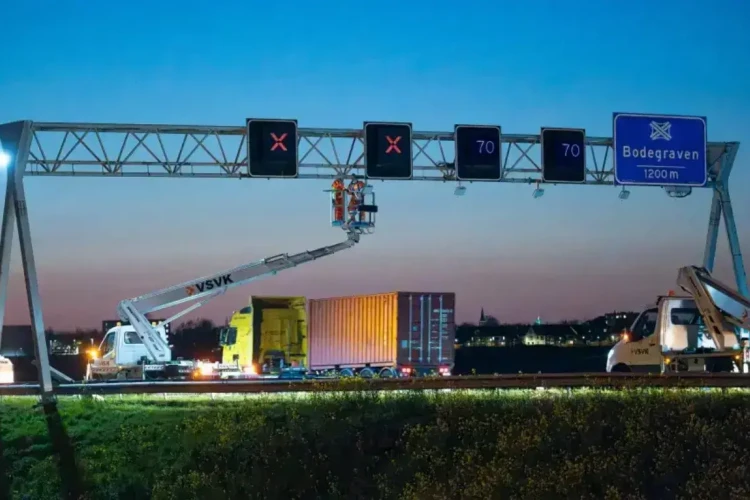Tests of toll collection equipment have begun on one of the Netherlands' busiest motorways. These systems will be essential for enforcing mileage-based tolls for lorries, which are set to replace the Eurovignette.
The first toll enforcement gantry for lorries in the Netherlands has been installed on the A12 near Bodegraven, close to Rotterdam. “These systems are crucial for monitoring compliance with the Truck Toll Act. Until toll collection begins – which is expected in mid-2026 – the cameras and other equipment on the gantry will undergo intensive, multi-stage testing,” said the RDW (Dutch Vehicle Authority).
Following the testing phase, the equipment will be used to monitor actual compliance with the new regulations. Another gantry will soon be installed on the A16 motorway.
“In total, 61 permanent gantries will be installed on Dutch motorways and national roads, all equipped with enforcement technology,” the RDW added.
Operation of the control system The enforcement equipment mounted on the gantries records the number plates of passing lorries and reads data from their on-board units (OBUs). This makes it possible to determine whether the vehicle is fitted with a functioning OBU and whether a valid contract with a toll service provider is in place.
The gantry on the A12 is the first to be equipped with camera systems and DSRC (Dedicated Short-Range Communication) antennas, which are used to communicate with the OBUs in lorries.
“Rijkswaterstaat installed the necessary electrical and digital infrastructure in the gantry. The supplier, Vitronic, subsequently installed the enforcement equipment. In the coming period, Vitronic and RDW will test whether the systems and data transmission are working properly. All elements must meet strict privacy and security requirements, and the cameras must deliver clear images under all weather conditions,” the RDW added.
New toll from 2026 The Eurovignette is expected to be replaced in the Netherlands by a kilometre-based toll in mid-2026.
“As in other countries, lorry operators will pay a fee for every kilometre driven on motorways, selected national roads, and certain municipal roads. (…) All revenue from the toll will be reinvested into innovation and the sustainable development of the transport sector,” explained the RDW.
From the moment the new toll is introduced, all lorries must be equipped with a functioning OBU at all times, regardless of the type of road they are using in the Netherlands. The OBUs determine the vehicle’s location using satellite navigation data, which in turn is used to calculate the distance travelled and the corresponding toll. Enforcement equipment installed at road access points will be used to supervise and enforce compliance.






